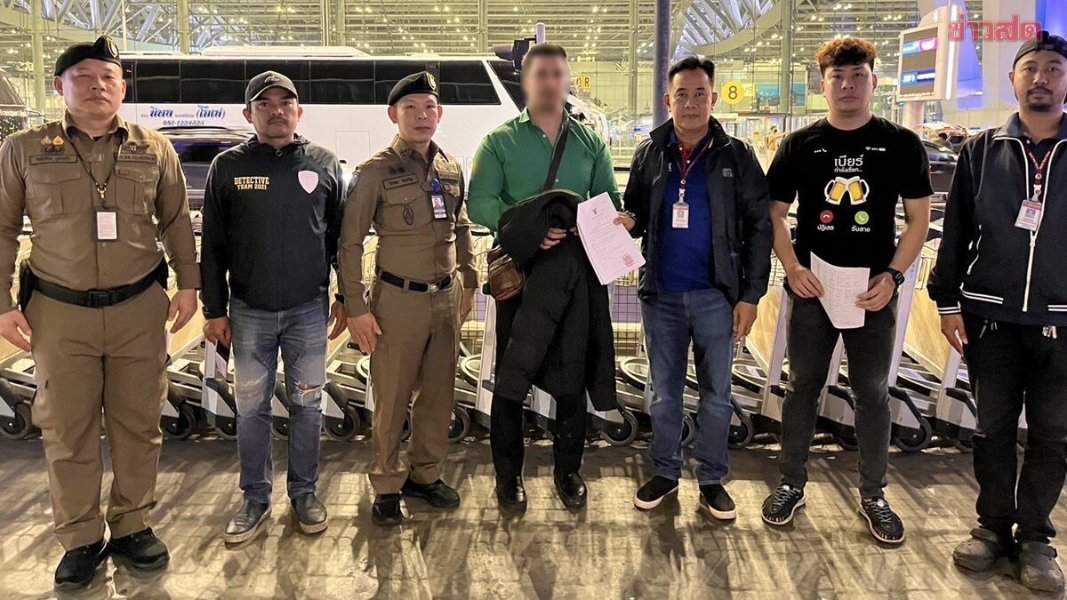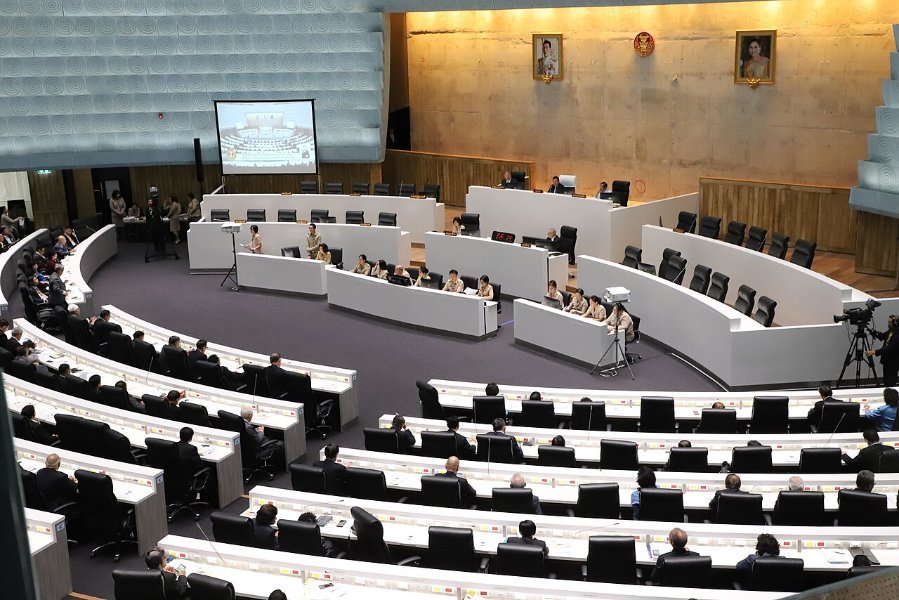-
Posts
393,393 -
Joined
-
Last visited
-
Days Won
804
Content Type
Events
Forums
Downloads
Quizzes
Gallery
Blogs
Everything posted by webfact
-
In a notable turn of events, General Prawit Wongsuwan, leader of the Palang Pracharath Party (PPP), is set to lead a critical censure debate against the government. As part of the opposition, General Prawit confirmed on 25th February that the debate will cover various topics, hinting at including the controversial "Alpine land" issue. When prompted by journalists about the inclusion of matters related to former Prime Minister Thaksin Shinawatra, particularly concerning the 14th floor, General Prawit cryptically stated, "There is the Alpine issue." He remained tight-lipped when asked if the debate might shake the government's standing, simply urging patience by saying, "Just wait and see." In a separate statement, Paiboon Nititawan, Secretary-General of the Palang Pracharath Party, announced that General Prawit will personally lead the PPP MPs during the debate’s first session. Although he won't be speaking himself, General Prawit will set the agenda and debate topics. The party plans to finalise their discussion points and select speakers in a meeting next week. The unfolding situation has captured public interest, as the opposition's challenge could potentially rattle the political landscape, reported Siam Rath. -- 2025-02-26
-

THAILAND LIVE Thailand Live Wednesday 26 February 2025
webfact replied to webfact's topic in Thailand Live
Violent Night Out: Security Guard Assaults Tourists on Bangla Road Photo courtesy of Patong Police via The Phuket News In the early hours today, February 25, a night out on Bangla Road turned ugly when two tourists were violently attacked by a security guard. The incident has prompted Patong Police to launch a hunt for the assailant. Full story: https://aseannow.com/topic/1352848-violent-night-out-security-guard-assaults-tourists-on-bangla-road/ -

THAILAND LIVE Thailand Live Wednesday 26 February 2025
webfact replied to webfact's topic in Thailand Live
Pai's Big Bust: 7 Tourists Nabbed for Public Cannabis Use Photo courtesy of KhaoSod In a decisive move to curb disruptive behavior, Pai Police have arrested seven foreign tourists for causing a public nuisance, including smoking cannabis in public. These arrests were made on February 24 as part of a campaign to maintain order in the popular tourist destination. Full story: https://aseannow.com/topic/1352845-pais-big-bust-7-tourists-nabbed-for-public-cannabis-use/ -

THAILAND LIVE Thailand Live Wednesday 26 February 2025
webfact replied to webfact's topic in Thailand Live
Public Concerns as Naked Foreigner Walks into Phuket Convenience Store Phuket residents have voiced concerns over foreigners’ behaviour after a video surfaced of an unidentified man walking completely naked to a convenience store in Soi Ta-Iad, Wichit, Mueang Phuket District. Full story: https://aseannow.com/topic/1352820-public-concerns-as-naked-foreigner-walks-into-phuket-convenience-store/ -

THAILAND LIVE Thailand Live Tuesday 25 February 2025
webfact replied to webfact's topic in Thailand Live
to continue: Thailand Live Wednesday 26 February 2025 https://aseannow.com/topic/1352837-thailand-live-wednesday-26-february-2025/ -
British Man Arrested in Thailand After 25-Year Visa Overstay Photo courtesy of The Pattaya News In a major crackdown, Chiang Mai Immigration recently arrested a British man who astonishingly overstayed his visa by 9,135 days—more than 25 years. This case marks one of the longest recorded visa overstays in Thailand's history. Full story: https://aseannow.com/topic/1352834-british-man-arrested-in-thailand-after-25-year-visa-overstay/
-

THAILAND LIVE Thailand Live Tuesday 25 February 2025
webfact replied to webfact's topic in Thailand Live
Thailand's Visa Policy Not Causing Crime Spike, Experts Say File photo for reference only Recent concerns linking the surge in crime to Thailand’s visa exemption policy have stirred headlines. Introduced earlier this year by the Pheu Thai government, the 60-day visa exemption allows tourists from various countries to enter without a visa, with a potential 30-day extension, covering over 90% of foreign visitors. Full story: https://aseannow.com/topic/1352815-thailands-visa-policy-not-causing-crime-spike-experts-say/ -
File photo for reference only Recent concerns linking the surge in crime to Thailand’s visa exemption policy have stirred headlines. Introduced earlier this year by the Pheu Thai government, the 60-day visa exemption allows tourists from various countries to enter without a visa, with a potential 30-day extension, covering over 90% of foreign visitors. This initiative, designed to bolster tourism, has faced criticism, with detractors arguing it has inadvertently fostered criminal activities such as scams, disorderly conduct, and illegal employment. The Thai Hotels Association recently highlighted the illegal renting of condominium units to tourists short-term, leading to property damage and disturbance among long-term residents. Meanwhile, Sisdivachr Cheerwarattanaporn, president of the Association of Thai Travel Agents, has pointed the finger primarily at lax law enforcement rather than the policy itself. He suggested trimming the visa-free period from 60 to 30 days might mitigate issues, even if it results in fewer tourist arrivals. However, many experts argue that the visa policy is not the root cause of these problems. Prior to this scheme, tourists were already able to stay in Thailand for up to 60 days through a combination of 30-day visa exemptions followed by extensions. Furthermore, the possibility of same-day border runs made it feasible for tourists to extend their stay considerably. Immigration lawyer Jessataporn Bunnag notes that such policies have seen various iterations over the years, including a previous allowance for a 45-day stay with a 30-day extension. Significantly, a new requirement slated for April 2025 will see a shift in how tourists enter Thailand. All visitors will need to complete an online entry authorization form ahead of their trip, detailing personal, travel, and accommodation information. While the Ministry of Foreign Affairs insists this is not a de facto visa, immigration officials indicate it is part of broader efforts to streamline data and prevent unwanted entries. While the debate continues, the focus remains on achieving a balance between facilitating tourism and maintaining security. The effectiveness of these measures will undoubtedly evolve, shaping the landscape of international travel to Thailand in the coming years. Ultimately, the ongoing changes in policy and enforcement underscore a proactive approach to addressing both tourism and security challenges in the kingdom, reported Pattaya Mail. -- 2025-02-25
-

THAILAND LIVE Thailand Live Tuesday 25 February 2025
webfact replied to webfact's topic in Thailand Live
Thailand Faces Scam Surge: 168 Million Calls and Texts in 2024 File photo courtesy: Security Intelligence Amid the technological boom, Thailand is experiencing an unprecedented rise in scam attempts, with an astonishing 168 million fraudulent calls and SMS messages reported in 2024. Full story: https://aseannow.com/topic/1352813-thailand-faces-scam-surge-168-million-calls-and-texts-in-2024/ -
File photo courtesy: Security Intelligence Amid the technological boom, Thailand is experiencing an unprecedented rise in scam attempts, with an astonishing 168 million fraudulent calls and SMS messages reported in 2024. This alarming figure marks the highest in five years, according to Gogolook Thailand, the firm behind the anti-scam app Whoscall. The surge highlights the increasingly sophisticated nature of these scams, fuelled by cutting-edge generative AI technologies. Crafty scammers are leveraging these advancements to indulge in impersonation fraud, financial deception, and data breaches, preying on unsuspecting individuals through phone calls, SMS messages, and deceptive links. Manwoo Joo, Head at Gogolook Thailand, stated, “Since launching our annual report in 2020, we’ve kept a keen eye on the ever-evolving scam scene in Whoscall’s core markets.” The report’s revelations are anything but comforting. Scam attempts soared by 112% compared to last year's 79.2 million. Scam calls alone have surged to approximately 38 million from the previous year's 20.8 million, while SMS scams have more than doubled, reaching nearly 130 million from last year's 58.3 million. Despite this, Whoscall’s Smart SMS Assistant successfully mitigated a portion of these attempts. The culprits behind these scams are reportedly focused on gambling and money loan schemes. Furthermore, they impersonate delivery and utility services, exploiting government policies such as electricity bill reductions and digital wallet initiatives to deceive people. In response to this escalating situation, Whoscall launched its innovative Web Checker feature in 2024, offering users a safer online browsing experience and helping them steer clear of malicious scammers' traps. Alarmingly, the report also uncovered significant personal data breaches, with 41% of Whoscall users in Thailand having sensitive information exposed on the dark and deep web. The most frequently compromised details include email addresses (97%) and phone numbers (88%), with potential leaks also encompassing birth dates, names, and passwords. This disturbing trend signals a critical need for increased vigilance and security measures, as scammers continue to use advanced technologies to exploit vulnerabilities and deceive individuals across the country, reported The Thaiger. -- 2025-02-25
-
- 4
-

-

THAILAND LIVE Thailand Live Tuesday 25 February 2025
webfact replied to webfact's topic in Thailand Live
Lisa Praised by Thai Govt for Showcasing Thailand in 'The White Lotus' Picture courtesy: NBT World Thai pop sensation Lalisa "Lisa" Manobal has been warmly commended by the Thai government for spotlighting Thailand’s picturesque locales in her recent appearance on HBO's hit series, 'The White Lotus'. Filmed across vibrant Thai locations including Bangkok, picturesque Phuket, and the idyllic Koh Samui, the series has brought Thailand’s scenic beauty to the forefront of international travel discussions, attracting fresh waves of tourists and significant global attention. Full story: https://aseannow.com/topic/1352809-lisa-praised-by-thai-govt-for-showcasing-thailand-in-the-white-lotus/ -
Picture courtesy: NBT World Thai pop sensation Lalisa "Lisa" Manobal has been warmly commended by the Thai government for spotlighting Thailand’s picturesque locales in her recent appearance on HBO's hit series, 'The White Lotus'. Filmed across vibrant Thai locations including Bangkok, picturesque Phuket, and the idyllic Koh Samui, the series has brought Thailand’s scenic beauty to the forefront of international travel discussions, attracting fresh waves of tourists and significant global attention. The show, renowned for its sharp storytelling and lush visuals, utilised Thailand’s striking landscapes as a stunning backdrop, weaving in destinations like the Ang Thong National Marine Park, the serene Choengmon Beach, and the bustling Fisherman’s Village. Such exposure has not only enriched the show’s appeal but has significantly enhanced Thailand’s global standing as a top-notch travel and filming destination. Following the airing of 'The White Lotus' Season 3, Thailand has witnessed a palpable boost in tourism figures. Koh Samui, in particular, has become a hotspot for would-be travellers, boasting a 12% rise in accommodation searches. Notably, U.S. tourist interest has surged by an impressive 65% month-on-month, reflecting an increased curiosity and desire to explore Thailand’s offerings. Moreover, Thailand has quickly ascended to secure a place amongst the top five most-searched travel destinations on platforms like Agoda. This newfound popularity is especially vibrant within the luxury travel segment, where demand for premium experiences is burgeoning. Consequently, this uptick in interest has pushed hotel bookings up and elevated the average daily room rate by a significant 40%. To maintain this momentum, Thailand has introduced a series of strategic policies aimed at bolstering its attractiveness as a filming hub. Enhanced financial incentives now offer up to a 30% cash rebate for film projects, with previous rebate limits eradicated to encourage bigger and bolder productions. These measures, coupled with additional perks for international investors in the film and entertainment sectors, are fortifying Thailand’s standing in the global film industry. Officials anticipate that the ripple effect of exposure from 'The White Lotus' will cultivate enduring benefits for Thailand's tourism and economy. Not only does it promise to draw continuous streams of international visitors, but it also paves the way for future collaborative projects, reaffirming Thailand as a premier choice for film and travel aficionados alike, reported NBT World. -- 2025-02-25
-

THAILAND LIVE Thailand Live Tuesday 25 February 2025
webfact replied to webfact's topic in Thailand Live
Iranian Man Arrested at Bangkok Airport for Indecent Act Against Female Rider Picture courtesy: Khaosod An Iranian man was apprehended at Suvarnabhumi Airport while attempting to flee Thailand. He is accused of committing an indecent act against a female rider. Full story: https://aseannow.com/topic/1352802-iranian-man-arrested-at-bangkok-airport-for-indecent-act-against-female-rider/ -
Picture courtesy: Khaosod An Iranian man was apprehended at Bangkok's Suvarnabhumi Airport while attempting to flee Thailand. He is accused of committing an indecent act against a female rider. Authorities had been on the hunt for the suspect, identified as 31-year-old Mohsen Teimourbalghour, following a complaint lodged on 23rd February. The complaint reported that the incident occurred when the female rider was making a passenger delivery. In distress, she ran to a police station for assistance. Upon receiving the complaint, officers at Lumpini Police Station quickly began gathering evidence, including video footage and CCTV images, which confirmed the suspect's identity. Consequently, the Criminal Court issued an arrest warrant against Mr. Teimourbalghour on 24th February for "committing an indecent act on a person over 15 years old." With the arrest warrant in hand, authorities collaborated with immigration officials to track the suspect. On the evening of 24th February, officials at Suvarnabhumi Airport were alerted that Mr. Teimourbalghour was attempting to leave the country. Immigration police detained him at the airport and he was subsequently transferred to Lumpini Police Station for further questioning and legal proceedings, reported Khaosod. -- 2025-02-25
- 30 replies
-
- 10
-

-

-

THAILAND LIVE Thailand Live Tuesday 25 February 2025
webfact replied to webfact's topic in Thailand Live
Baht Poised for Dip to 35 per USD by Mid-2025, Experts Predict File photo for reference only The Thai baht is predicted to weaken to around 35 per US dollar by mid-2025, according to forecasts from Standard Chartered Bank (Thai). This anticipated dip is largely attributed to escalating global trade tensions, particularly between the US and China. Full story: https://aseannow.com/topic/1352799-baht-poised-for-dip-to-35-per-usd-by-mid-2025-experts-predict/ -
File photo for reference only The Thai baht is predicted to weaken to around 35 per US dollar by mid-2025, according to forecasts from Standard Chartered Bank (Thai). This anticipated dip is largely attributed to escalating global trade tensions, particularly between the US and China. Tim Leelahaphan, Vice-President and Economist at the bank, highlights trade disputes among international partners as a principal factor in the baht’s expected depreciation. The prediction notes that by the second quarter of 2025, these tensions will negatively impact the baht's strength, though the currency is anticipated to partially rebound to approximately 34.50 by the year's end. This year is also set to see significant volatility in the baht compared to other regional currencies. Contributing factors include shifts in gold prices and the performance of Thailand’s vital tourism sector, Mr Tim explained. Reflecting on recent history, the baht began 2024 at about 34 to the USD, weakened to nearly 38 by August, then appreciated to 32, influenced heavily by internal political dynamics. It concluded the year steady at around 34 to the dollar. Looking forward, Standard Chartered expects the Bank of Thailand's Monetary Policy Committee (MPC) to maintain its interest rate at 2.25% in its meeting tomorrow. This stance reflects ongoing economic recovery and stable prices, offering a balanced policy approach. The MPC will also weigh the potential risks from trade conflicts and monitor domestic economic conditions closely. Tim Leelahaphan remarked, "Our analysis points to an 80% probability that the central bank will keep the current policy rate during the upcoming meeting and into the next quarter. Any rate cut, potentially by 0.25 percentage points to 2%, is anticipated in June." There’s a strategic intent to preserve policy flexibility in anticipation of evolving trade tensions, particularly surrounding US trade policies, which are expected to become clearer by mid-year. Meanwhile, the US Federal Reserve is anticipated to delay policy rate adjustments previously expected sooner. Amidst these financial conditions, Standard Chartered forecasts Thailand's GDP will grow by 2.8% in 2025, buoyed by strong performances in tourism and domestic spending. Thailand’s tourism sector is notably recovering well, with foreign arrivals reaching 3.97 million by early February, matching pre-pandemic figures from 2019. This resurgence is expected to gain momentum in the second half of the year. Moreover, the third phase of the government’s digital wallet initiative, allocating a substantial 140 billion baht (approximately 1% of GDP), is set to commence in the second quarter, providing a further boost to consumer spending. Despite these positive indicators, Mr Tim warns of heightened uncertainty in the coming months, particularly concerning US trade policy impacts, which could introduce additional economic risks in later quarters, reported Bangkok Post. -- 2025-02-25
-
File photo for reference only. Courtesy: Wikipedia Thailand's thriving tourism industry is facing a new challenge: the surge in illegal hotel operations. Particularly in hotspots like Phuket and Bangkok, the practice of renting out residential properties as short-term lodging is raising concern. The Thai Hotels Association (THA) has highlighted this issue, pointing fingers at both foreign and local investors for circumventing the Hotel Act's regulations, which stipulate a minimum 30-day rental period for such accommodations. Recent incidents, such as the chaos caused by a foreign national in a Bangkok condo, have brought this issue into the spotlight. These short-term, daily rentals often disrupt neighbourhoods, drawing the ire of local residents and creating tensions within communities. Phuket, renowned for its upscale villas, has seen a significant portion of its luxury properties snapped up by Russian investors. Meanwhile, in Bangkok, Chinese buyers frequently scoop up entire blocks of condos, sometimes even whole villages of high-end single houses, transforming them into short-term rental hubs complete with tourist shuttle services. This rampant growth of illegal accommodations is causing alarm among tourism and hospitality professionals. Thienprasit Chaiyapatranun, president of the THA, stresses the need for stricter regulations, particularly limiting the number of properties a foreign buyer can acquire. This, he argues, would prevent the monopolisation of condo floors for illegal rental purposes, ensuring fair distribution of ownership opportunities across developments. The burden of illegal activities extends to the tourism sector's reputation. Sisdivachr Cheewarattanaporn, president of the Association of Thai Travel Agents (Atta), voiced concerns over Thailand’s image as a place where money supposedly makes law-breaking possible. Weak law enforcement, he asserts, undermines confidence and safety, discouraging potential visitors in a post-pandemic tourism recovery landscape. Despite governmental crackdowns on organised crime, the anticipated rebound of Chinese tourists is not yet in full swing. Currently, daily arrivals from China are around 10,000, considerably down from the 30,000 daily visits seen in 2019. Illegal work practices among foreigners are also chewing into local job opportunities, adding another layer of complexity to the situation. In response, the government is being urged to consider reducing the visa-free stay duration from 60 to 30 days for citizens of 93 countries. This policy adjustment could help curb the influx of those leveraging lenient visa durations for unauthorised activities. However, the Tourism Authority of Thailand’s aim of attracting 8-9 million Chinese visitors this year might fall short unless these safety and regulatory challenges are adequately addressed. The rise of illegal hotel practices not only threatens the local economy but also tests the resilience of Thailand's tourism sector. With decisive action, the country hopes to protect both its communities and its cherished tourist industry, reported Bangkok Post. -- 2025-02-25
-

THAILAND LIVE Thailand Live Tuesday 25 February 2025
webfact replied to webfact's topic in Thailand Live
Thailand Faces Backlash Over Rise of Illegal Hotel Operations File photo for reference only. Courtesy: Wikipedia Thailand's thriving tourism industry is facing a new challenge: the surge in illegal hotel operations. Particularly in hotspots like Phuket and Bangkok, the practice of renting out residential properties as short-term lodging is raising concern. Full story: https://aseannow.com/topic/1352795-thailand-faces-backlash-over-rise-of-illegal-hotel-operations/ -

THAILAND LIVE Thailand Live Tuesday 25 February 2025
webfact replied to webfact's topic in Thailand Live
DSI Poised to Investigate Thai Senatorial Election Scandal File photo for reference only In a significant development, Thailand's Department of Special Investigation (DSI) is preparing to tackle allegations of electoral malpractice in the recent senatorial elections. Full story: https://aseannow.com/topic/1352791-dsi-poised-to-investigate-thai-senatorial-election-scandal/ -

THAILAND LIVE Thailand Live Tuesday 25 February 2025
webfact replied to webfact's topic in Thailand Live
Thai Workforce Needs Foreign Skills: Academics Dismiss Job Fears ASEAN NOW picture for reference only Recent concerns over Chinese students in Thailand potentially outcompeting Thai graduates have been played down by leading academics. They argue that rather than edging out Thai job seekers, these students help plug the skills gap and enhance economic relations. Full story: https://aseannow.com/topic/1352787-thai-workforce-needs-foreign-skills-academics-dismiss-job-fears/ -
Pictture courtesy: Pattaya One News Authorities in Thailand have flagged a worrying trend in the capital's entertainment districts, where vapes containing sedative drugs are being sold to unsuspecting teenagers. Dubbed "zombie cigarettes," these products are reportedly circulating in Bangkok's lively Thonglor nightlife area, posing significant health risks. Deputy Spokesperson for the Prime Minister’s Office, Anukul Prueksanusak, warned of a new wave of homemade narcotics infiltrating the country's already challenging battle against drug trafficking. The latest concern is the shocking combination of electronic cigarettes infused with Etomidate—an anaesthetic typically reserved for controlled medical environments. When abused recreationally, Etomidate can induce profound drowsiness, slowed breathing, drastic blood pressure drops, nausea, disorientation, and even loss of consciousness, potentially with fatal consequences. Despite the inherent dangers, these zombie cigarettes are being distributed illicitly both on the ground and online, marketed under the guise of relaxation aids, making them especially enticing to youth. Government officials have issued a stern caution: these are not harmless adventures into relaxation. The unpredictable chemical concoctions pose severe health risks, enhanced by the vaping delivery system. Moreover, the systemic effects of Etomidate misuse can meddle with cortisol balance and muscle function long after the initial "high" fades. Parents and guardians are urged to maintain openness with young people, helping them understand the severity of the threat posed by such deceptive products. The unpredictability of the dosages, combined with an unknown array of added substances, could make these vapes lethal. As the government intensifies its scrutiny and crackdowns against the distribution of zombie cigarettes, efforts are expanding to educate the public. Anukul's warning underscores the essential need for community vigilance to stifle the tide of these drug-laden e-cigarettes, with an emphasis on supportive dialogues at home. Action continues from multiple agencies working collaboratively to stem the flow of these substances onto the streets and into the lives of vulnerable teenagers. Public awareness campaigns aim to empower informed choices, countering the allure of these undisclosed chemical mix vape products. In the face of this sinister vaping trend, Thai authorities stress the importance of staying informed and cautious, reinforcing the message that not all that glitters in electronic packaging is safe—or even remotely benign, reported The Thaiger. -- 2025-02-25
-
File photo for reference only In a significant development, Thailand's Department of Special Investigation (DSI) is preparing to tackle allegations of electoral malpractice in the recent senatorial elections. Reports suggest that up to 138 of the 200 elected senators may be embroiled in high-profile vote-rigging and money laundering schemes, potentially triggering a special lawsuit under the DSI's oversight. The Justice Ministry, led by Thavi Sodsong, has directed the DSI's Committee on Special Lawsuits to meet and potentially launch an investigation into the accusations. Helming the committee is Deputy Prime Minister and Defence Minister, Phumtham Wechayachai. Known for his close ties with Prime Minister Paetongtarn Shinawatra’s de facto Pheu Thai party leader Thaksin Shinawatra, Phumtham is expected to spearhead efforts to scrutinise alleged conspiracies in the electoral process. At the heart of these accusations are suspicions of a coordinated effort allegedly linked to Newin Chidchob, the influential figure behind the Bhumjaithai Party. The allegations include the distribution of vote-casting scripts to ensure predictable outcomes in elections, essentially undermining the integrity of district, provincial, and national-level races last year. This has cast a shadow over the legitimacy of those elected to senatorial positions, most of whom are reportedly connected to Bhumjaithai. Should the DSI proceed, an intensive investigation will unfold over the coming months, re-examining the contests that have prompted official complaints. Some of the defeated candidates, left disgruntled by the Election Commission's dismissal of their grievances, have noticed with anticipation the possibility of renewed scrutiny that this DSI investigation represents. If the investigation culminates in charges, the implicated senators could face immediate suspension and asset seizures pending judicial proceedings. In a worst-case scenario, they might be stripped of their senatorial status, necessitating re-elections and potentially reshaping the political landscape. What's particularly concerning are the claims that many of the senators were unaware of each other before the elections yet convened at the same venues, indicating possible orchestration behind their sudden camaraderie. Meanwhile, any direct dialogue or reconciliation between Bhumjaithai's Newin and Pheu Thai’s de facto boss Thaksin remains absent, even as the ruling coalition navigates these tumultuous waters. A planned meeting among coalition partners is set for tomorrow to possibly address internal tensions. This investigation not only reflects the internal political dynamics of Thailand but also serves as a critical examination of the country's electoral integrity, making it a developing story of high domestic and international interest. As it unfolds, the implications could resonate beyond partisan politics, directly affecting governance and public sentiment across the kingdom, reported Thai Newsroom. -- 2025-02-25
-
ASEAN NOW picture for reference only Recent concerns over Chinese students in Thailand potentially outcompeting Thai graduates have been played down by leading academics. They argue that rather than edging out Thai job seekers, these students help plug the skills gap and enhance economic relations. The debate sparked after Prof Supachai Pathumnakul from the Ministry of Higher Education shed light on Chinese investment in three Thai private universities. This led to fears about Chinese graduates competing against locals, particularly in companies requiring Chinese language proficiency. The influx of Chinese students is largely due to China's limited university seats, prompting around two to three million students to study abroad annually. Thailand's lower cost of living makes it an attractive option, reflected in the fact that over half of the 53,000 foreign students in Thailand last year were Chinese. Far from viewing them as competition, Prof Dr Buppa Lapawattnaphun regards Chinese students as facilitators, bridging Thai and Chinese labour markets. She notes that while Thai graduates might find it challenging to compete for positions in Chinese companies, they too gain advantageous prospects when returning to work for Thai firms with a Chinese presence. Thailand's workforce, comprised of 38 million people, has only 22%—around 8.5 million workers—with university qualifications. Dr Thanawat Polvichai highlights this shortfall, emphasising the need for skilled foreign workers. Chinese graduates can fill this gap, contributing to sectors requiring expertise. Dr Thanawat urges for a nuanced perspective, distinguishing between unskilled and skilled labour, noting the latter's scarcity remains a pressing issue in Thailand. Saengchai Thirakulvanij from the Thai SMEs Federation sees an even broader role for these students. He suggests positioning Chinese graduates as ambassadors for both education and tourism. Planting a seed of affinity for Thailand could result in increased interest from family and friends in the Chinese students' networks, boosting Thai tourism indirectly. Given Thailand's limited budget for workforce development, Chinese and other foreign graduates from local private universities can potentially fill job market gaps. Understanding this landscape, academics urge that instead of seeing Chinese students as a threat, Thai policymakers should leverage their presence to bolster the educational sector and economic resilience. By embracing international students as partners rather than adversaries, Thailand can enhance its socio-economic fabric, while fostering closer ties with one of its largest neighbouring economies, reported The Nation. -- 2025-02-25
-

THAILAND LIVE Thailand Live Tuesday 25 February 2025
webfact replied to webfact's topic in Thailand Live
Zombie Vapes Alert: Thai Teens Targeted with Sedative-Infused E-Cigs Pictture courtesy: Pattaya One News Authorities in Thailand have flagged a worrying trend in the capital's entertainment districts, where vapes containing sedative drugs are being sold to unsuspecting teenagers. Dubbed "zombie cigarettes," these products are reportedly circulating in the lively Thonglor nightlife area, posing significant health risks. Full story: https://aseannow.com/topic/1352779-zombie-vapes-alert-thai-teens-targeted-with-sedative-infused-e-cigs/ -

Thailand's Auto Output Drops 24.63% as Domestic Sales Falter
webfact posted a topic in Thailand News
Picture courtesy: Thailand Business News Thailand, a key player in Southeast Asia's automotive industry, has seen a sharp decline in car production, with a notable drop of 24.63% in January compared to the same period last year. The Federation of Thai Industries (FTI) revealed today that production numbers plummeted to 107,103 units in January, primarily due to weakening domestic sales and falling exports. As the region's largest automotive production hub, Thailand hosts factories for prominent global manufacturers such as Toyota and Honda. The recent figures are alarming, highlighting an 18-month streak of consecutive production decreases. December saw a 17.37% year-on-year drop, making January's figures particularly concerning. Surapong Paisitpattanapong, the spokesperson for the FTI's automotive division, expressed his surprise at the sharp decline, acknowledging the unexpected severity of the statistics. "The production numbers are really low," he remarked during a news conference. Domestic sales in Thailand fell by 12.26% in January compared to the previous year, with only 48,092 units sold. This dip followed a December decrease of 20.94%. The federation attributes the decline to tighter auto loan conditions, exacerbated by high household debt levels in the country. The export sector also faced challenges, with a significant 28.13% year-on-year reduction, equating to 62,321 units. Notably, this marks the lowest export figure in 33 months, driven by heightened competition from Chinese automotive brands. In contrast, December saw a 15.46% drop, highlighting the escalating issues this year. Export destinations like Australia, the Philippines, and Japan remain crucial markets for Thailand's automotive exports. With such a significant downturn, the FTI is paying close attention to upcoming governmental measures aimed at alleviating issues related to auto loans. Additionally, there is a focus on potential impacts from changes in the United States’ automobile tariff policies. Such changes could shape the industry landscape, as US President Donald Trump has indicated potential levies on automotive imports, with decisions expected by early April. The current situation raises concerns within Thailand's automotive industry, urging stakeholders to adapt and seek solutions to mitigate these downward trends. With ongoing discussions and potential policy changes on the horizon, the industry's future remains closely monitored by both domestic and international observers. The overall impact on the Thai economy is significant, underscoring the need for strategic responses to these evolving challenges, reported Reuters via Thai Newsroom. -- 2025-02-25


















